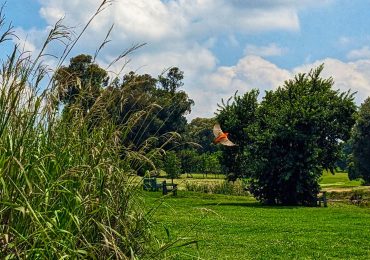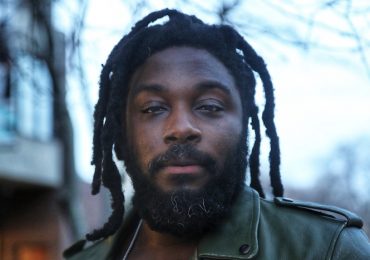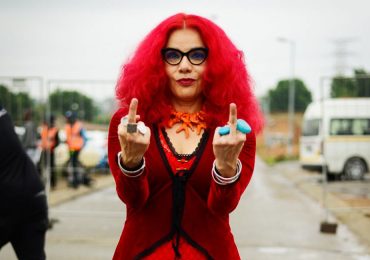Exclusive to The JRB, a new short story by Julie Nxadi.
~~~
The End of a Conversation
I remember the first time I learned about real secrets. It was an otherwise uneventful day and I was in the backroom my mother and I shared. I am not sure of my exact age, but my ashy legs were just too long for my torso and they were sprawled—obtuse—on the floor in front of me. I was tall for my age, but still felt a safe kind of little. My safe kind of little perfect life. All the things that I knew, I knew for sure: That my name ‘rolled off of the tongue’ (everybody’s mother said so). That school was making me seem bigger (I stood in the middle of the back row in class pictures). I knew that summer days were longer than winter days and that when we climbed up and into the pool that had been erected for us in the spring, Whiskey (our Maltese) would always climb in after us but Bianca (our Alsatian) would hesitate. I knew that peace and happiness were routine: Kideo, two Provitas and ‘Oh boy! Mom remembered Melrose’ cheese wedges after school. Playing in the pool, but only after completed homework could be produced. Bath time: high pitched scream-laughter. Flannel pajamas. Peas under overturned gemsquash halves (All-Gold on everything). Bedtime writhing: excited for tomorrow. Excited to do it all again. A tight schedule and a quiet bliss.
What I was doing on the floor that day, I can’t really say (memories don’t work that way). I just know that things were sure and quiet like I had always known them to be.
Just behind me my mother stood at an ironing board over my school uniform, listening to her cassettes. I don’t know how much I understood about my mother being a domestic worker. Up until that day I had considered us all to be some sort of a rendition of a TV family. Like Different Strokes or something. Her employers, Uncle Someone and Aunty Somebody-Else, lived in the main house and since I had only ever known them to be my aunt and uncle, I loved them as such. I had also only known to love their children as my cousins. Once Aunty Somebody-Else and my cousins made a pit stop on a road trip they were taking and visited my grandmother in the Eastern Cape. When they returned, Aunty Somebody-Else brought with her details of how my grandmother’s sheep were healthy and assured my mother that ‘Mama is well too.’ I watched my mother share uMama with Aunty Somebody-Else like this often. My love was not unreasonable.
My older cousin—their daughter—had long, unruly red hair and freckles scattered across every inch of her body. She was the only one with freckles and red hair and she hated them. She would cry about them: Her freckles and her red hair. She wanted to make her hair dark and zap away her freckles and leave only the whiteness that they were interrupting. I felt bad for her sometimes, and if she weren’t so moody I could have helped her with the advice my mother gave me when I wanted to perm my hair and change my skin: ‘You are not Michael Jackson, Julie. You never will be.’
My youngest cousin—their son—was my first experience of anything close to a sibling (my older brother was much older and lived completely separated from us). I was not sure how family worked but something in me insisted that if cousins loved each other enough they grew to become siblings. I had those hopes for my youngest cousin—their son—and me.
His hair wasn’t unruly like his sister’s, it glowed gold and bounced in soft spirals so delicate that they didn’t curl all the way back around. His eyes were blue and wide and everyone was always so happy to see him.
And we were always side by side:
We started a silkworm farm together.
We solved mysteries in the back yard together.
We stained our whole lives with mulberries, learned to ride bikes, and got chickenpox together.
My made-for-TV family was always with me, even in crayon. In grade one, my teacher once pointed to all the people in my family portrait that were ‘skin coloured’ and told me that they were not my kin. The two brown stick figures in the middle of that portrait stood alone in my mind until I asked Aunty Somebody-Else about what my teacher had said. She waved off my teacher’s observation. That was enough for me.
I knew of the theory that we were not a family but the evidence to the contrary was too compelling—I had fallen asleep in my Aunt’s arms too many times, I think, my cousin and I had shared too much bath water, maybe.
Nicole-From-Down-the-Street’s grandfather called my mother a maid once but I quickly considered the source, who had been called a ‘sketchy shit nugget’ by my mother and my aunty more than once. There was just no way that a nugget of shit could know much about family, I concluded. Yes, my mother cleaned the house and cooked but that did not explain what I was doing there. If my mother was at work, then what was I doing there? If we were not entangled in some sort of kinship—if my mother was fulfilling a contractual obligation—what was I doing there?
I was sitting on the floor and my mother was ironing:
The sun was low.
I know because when Uncle Someone knocked twice and then stood with his back against the frame and his feet straddled on either side of the threshold, I had to squint directly into the searing light to catch the silhouette of his hanging head.
He stood there quietly.
‘Yintoni?’ my mother growled at him in a skeptical tenor that I have since inherited.
He stood quietly, swaying slightly.
The steam from the iron huffed as my mother sat it on its haunches. I was not looking at her but I was sure that her hand had gone directly to her hip after she put the iron down because she was an impatient and animated woman of very few words. Me and my cousin—their son—once burned a hole in the carpet because we were trying to ‘do science’ and we were quickly introduced to the very many nuances of my mother’s codes and signals, so nobody knew her actions like we did. But she was softer with my cousin—their son.
Even when we stood side by side. Even when he was wrong.
So I had to learn her silence. And as the iron hissed and huffed itself cool behind me I knew without looking at her that she was as concerned as she was impatient.
And so I became concerned.
‘She said she doesn’t love me anymore,’ he said, and tears fell from his hanging face.
My mouth fell open. Who could say such a thing? What does that mean?
‘Who?’ my mother asked, and I sat as quietly as I could awaiting the answer with her.
He said Aunty Somebody-Else’s name, and I was sure he had misunderstood. Because I knew that Aunty Somebody-Else believed in something different: That love was like the sky—it changes but it does not end. She had told me so. So it could not be my aunty saying these things because it would be like saying that the sky was finished. What happens when the sky is finished?
Uncle Someone was sobbing while my mother embraced him with silence. This man that I was slightly afraid of was sobbing and the sun was swallowing him in the frame of the door of the backroom that my mother and I shared. I was sure that he was dying. He was dying at our door and I could deal with that better than I could deal with the end of love. If he dropped dead on that threshold and we had to bury and mourn him, it would have made more sense to me than whatever the fuck this man thought he had heard about love running out. Not night. No clouds. No changing light. Just no more sky? No more always or forever?
Memories are funny things because I do not know how long he was standing there haemorrhaging anguish.
He was crying so loudly.
Not audibly: He barely made a sound. But so loudly that I could not hear the questions I was asking in my head and I could not hear the few words that he and my mother were passing back and forth.
Loud.
I wanted out. I wanted to speak to my cousin—their son. I wanted to ask him if he knew what was going on. He was always so much braver than I was, I never quite understood how. He asked whatever question found its way onto his tongue and he expected answers. He would know how to resolve this. He would clear this right up and wash away this chaotic memory of his father running over with tears at the door of my and my mother’s room.
Uncle Someone hushed.
Then came that sing-song sequence that signals the end of a conversation.
My mother turned on a small lamp she kept on the dressing table near the bed and washed the room in an amber warm that woke me from my trance. I had been staring so intently at Uncle Someone, waiting for him to crumble into a million pieces or for the sun to swallow him whole. Waiting for him to be survived by his wife, his children, his dear friend, his beloved niece, and the sky. I stared at him intently, sure that he would die. I was so sure that he would die that I did not see him swallow the sun.
It was dark now.
Then.
It was done.
He stepped just beyond the door, swinging his arms just outside and preparing to walk off into the dark. He was not dead. But many things were. I had to speak to my cousin: Our family was falling apart.
Uncle Someone said goodnight and started towards the main house, but then stopped, came back and said: ‘Don’t say anything to the kids. We don’t want to upset them.’
He glanced at me absentmindedly and then winked at me like he always did, and I smiled because I always did when he winked at me—it was like our high five.
He left.
I did not say anything to their son.
I was not ‘the kids’.
I was not their kin.
~~~
- Julie Nxadi is a writer and artist from Makhanda and Ngqushwa in the Eastern Cape, currently based in Cape Town. Her current research interest is ‘intimacy and oppression in post ’94 South Africa’, a subject that she is exploring using multiple mediums, writing being just one.






I really loved reading this.
I kept on reading this over and over again because the wordplay is amazing ? “He glanced at me absentmindedly and then winked at me like he always did, and I smiled because I always did when he winked at me”
“I did not say anything to their son
I was not ‘the kids’
I was not their kin”
Honestly, this is eloquently written